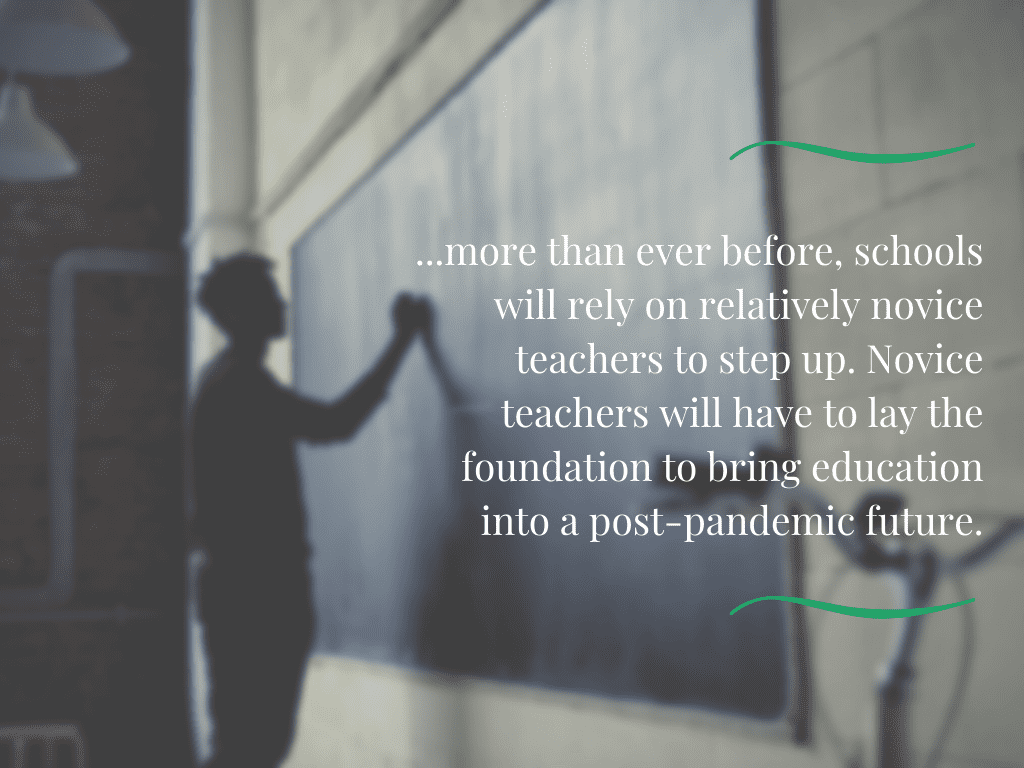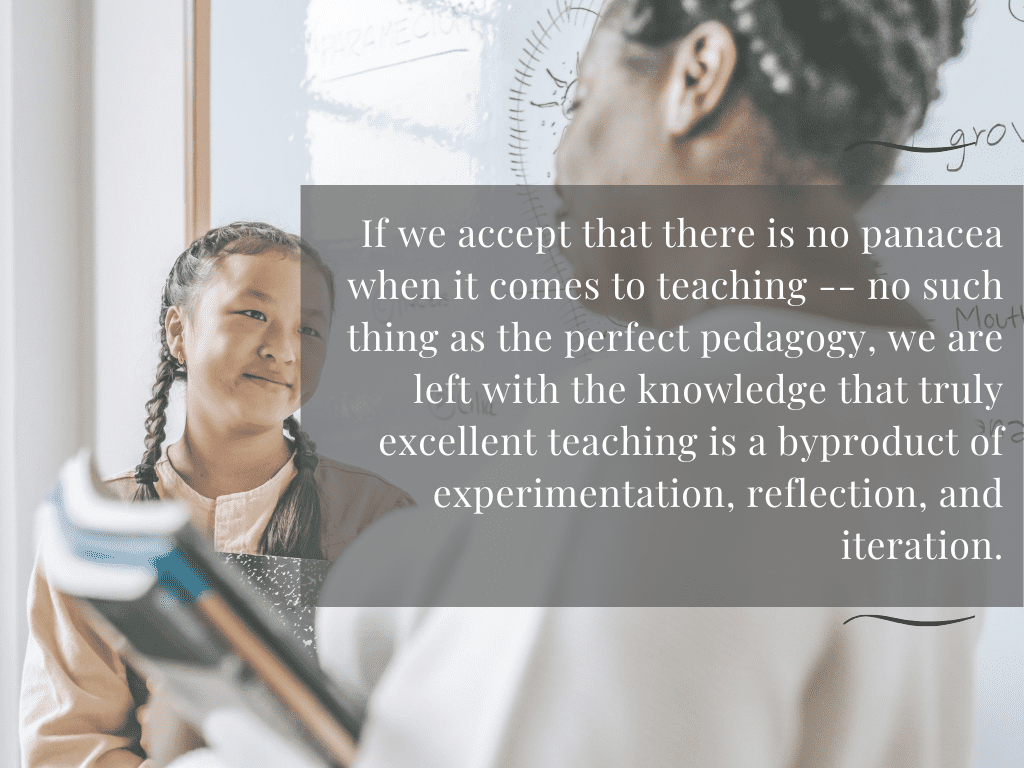Teaching is a deeply complex and, at times, frustrating job. It is understandable that so many novice teachers leave the profession. A 2018 study found that a whopping 44 percent of teachers leave the profession within their first five years — an attrition rate astronomically higher than other comparable occupations. Only 14 percent of pharmacists, 16 percent of engineers, and 19 percent of nurses and lawyers leave in their first five years. Even within education, novice teachers are unique in their likelihood to quit. Newer teachers are 2 ½ times more likely to quit than those who are tenured.
The thing is, these attrition numbers for novice and veteran teachers have come to mirror one another since the onset of COVID-19 pandemic. Since March 2020, there has been a significant increase in teacher retirements and an uptick in the number of veteran teachers interested in pursuing career changes. Nationally, there has been a 26% increase in retirements. And, over 50% of veteran teachers are now considering leaving the profession, as satisfaction with their schools sank to 44% in October of this year down from 69% in March 2020.
Staggering as these numbers are, they are not set to stabilize any time soon. A recent survey out of the U.K. found that 35% of veteran teachers said they would “definitely” not be working in education by 2026.
What does this all mean?
It means that more than ever before, schools will rely on relatively novice teachers to step up. Novice teachers will have to lay the foundation to bring education into a post-pandemic future. The question now is what we can glean from those novice teachers who have been in the profession since March 2020, and have led the way over these past three school years.

With teacher shortages across the country only worsening, a system with sky-high attrition rates for both novice and veteran teachers is not sustainable. Because it’s impractical to prevent teachers from retiring, we need to focus our efforts on figuring out what we can do to retain novice educators. This is precisely what I sought to better understand in a recent survey of novice teachers.
Survey participants represented a cross section of disciplines, demography, and geography. Every division of education was accounted for, from preschool through high school. At the secondary level, all major disciplines were accounted for, including the humanities, STEM, fine arts, performing arts, and physical education. Fifty percent of participants were People of Color (PoC) or ethno-religious minorities, with all but one participant identifying as U.S. citizens. Participants are currently working across five states and three countries, with international participants working in schools in South Africa and Singapore.
So, what can novice educators teach us? Let’s take a look:
Question #1: Please share what professional or personal characteristics you possess that have allowed you to find success in adjusting to the constant change inherent to the time.
In 1995, McArthur Wheeler robbed two banks in broad daylight in Pittsburgh, Pennsylvania. The 5’6” 270-pound bank robber would have been tough to miss under normal circumstances, but Wheeler had a surefire way to make himself invisible to bank cameras. You see, before going on his crime spree, Wheeler covered his face in lemon juice. Wheeler knew that lemon juice is used as an invisible ink. Logically, then, lemon juice would make his face invisible to cameras.
As he was being handcuffed by police just hours after robbing the second bank, he incredulously shouted, “But I wore the juice!” This case of criminal ineptitude served as the foundation for what has since come to be known as the Dunning-Kruger effect, which is a cognitive bias that results in people with little knowledge of a task or within a domain to overestimate their competence or ability. This effect is precisely what you wouldn’t want to find in a novice teacher, and survey participants echoed this sentiment. As one respondent succinctly shared, “You don’t know what you don’t know until you know it. I have been willing to deal with change with a growth mindset and have had a desire for professional development.” According to survey participants, an understanding of the positive correlation between experience and expertise is indispensable.
Question #2: Please share what skills you possess that have allowed you to find success in adjusting to the constant change inherent to the times.
When I think back to my own intensive yearlong teacher training program in 2012-13, I can clearly identify its gaps. This is not anyone’s fault, of course — teacher training programs are notoriously challenging nuts to crack. I mean, there’s simply so much to learn in such a short amount of time. With the exception of the disruption that Hurricane Sandy caused my New Jersey school, there was symmetry between what I learned in my teacher training program and the real-life conditions of the classroom. And still, I felt underprepared. Leap forward to 2020-21, and the asymmetry has been astounding. This is why survey participants agreed that more than a single skill, it was actually a mindset that was most essential. Participants agreed that “a focus on on-the-job training” was the key to adjusting to the constant change of the times. According to this group of novice teachers, other novice teachers simply have to appreciate the limitations of their teaching training programs, and recognize the need for on-the-job training.
Question #3: Please share what you think separates novice teachers who have found success over the past three school years with those who struggled and left the profession.
A 2018 article on supporting Gen Z teachers found that “Gen Z-ers grew up in a time of personalization and digital resources, so they didn’t always need an adult around to learn — which has increased their tendencies as solo players.” The advice from this article — and an updated version published in 2021 — is for schools to replace some teacher-to-teacher collaboration with task-oriented checklists. Survey respondents, however, disagreed with this suggestion. Rather, survey participants almost uniformly cited in-school mentors and a willingness to collaborate with others as distinguishing factors between novice teachers who found success and those who didn’t. As one participant shared, “A friend of mine thought that she could figure it out on her own. I took the opposite approach. She’s now working in sales, which is totally fine, but I just think as new teachers we need to find mentors right now.”

For more information and tips on how to help teachers exploit what’s working and explore what isn’t, check out this blog post I published with The Core Collaborative.
Question #4: Please share what you think separates more novice teachers who have found success over the past three school years with more veteran teachers who did not.
If we accept that there is no panacea when it comes to teaching — no such thing as the perfect pedagogy, we are left with the knowledge that truly excellent teaching is a byproduct of experimentation, reflection, and iteration. Survey participants suggested that this mindset is what distinguished successful novice teachers from veteran teachers who struggled to find success. “Teachers who used the same lesson plans for 10+ years probably found that those would not work with the growth of technology in the classroom. Their inability to be flexible and try new things kept them feeling out of touch and less successful than years past….Novice teachers are constantly trying new ideas, trying to find what works. We don’t have 10+ years of content to draw from, so we have to learn straight from our students and the classroom experience which is of course constantly changing.”

Question #5: Please share the advice you’d give to teachers in their first year.
In this video, popular Tik Toker Wolf_Duckworth hilariously exhibits the contrast between what we learn about classroom management in our teacher training programs and the strategies we deploy when we have a classroom of our own. Interestingly, even in a pandemic, the advice that a majority of survey participants had for first-year teachers revolved around classroom management. It’d seem that when it comes to classroom management, there is no substitute for experience, and that it should remain a focus of professional development for teachers new to the profession. As one participant wrote, “Your connection with the students will end up being your biggest classroom management tool.”
Question #6: Teaching during COVID has been a massive challenge. It also is likely not the last one we will have to deal with during our teaching careers. What future challenges do you expect to encounter, and how are you better prepared to face these challenges now?
In a profession as complex as teaching, imposter syndrome is going to creep in now and again. It’s especially pronounced early in one’s teaching career, when our toolkits are less robust. One positive from this pandemic, however, is that it accelerated the pace at which novice teachers grew their toolkits. In turn, the pandemic sped up the sort of self-confidence that novice teachers have in their aptitude and competence. “That’s the funny thing about future challenges,” one participant shared. “I have no clue what’s coming. But I have proven to myself the ability I have to adapt. I trust myself!” As we know from study after study, this trust in one’s ability is one of the surest ways to mitigate feelings of stress and burnout, because it increases feelings of controllability.
Gen Z teachers are beginning their careers amid the COVID-19 pandemic. This is a generation that has come of age in a post-9/11 world where the internet and social media have been ubiquitous. Developing the efficacy for novice, Gen Z teachers requires us to understand the unique traits they possess. This understanding will better enable us to create the working conditions most favorable to keeping them in the profession for more than five years.
As a Middle School Director, my takeaways are that mentorship, collaboration, on-the-job training, and tailored professional development are how I need to invest resources to support novice teachers. Based on participants’ responses, what are some things that you will start doing to support novice teachers?
















